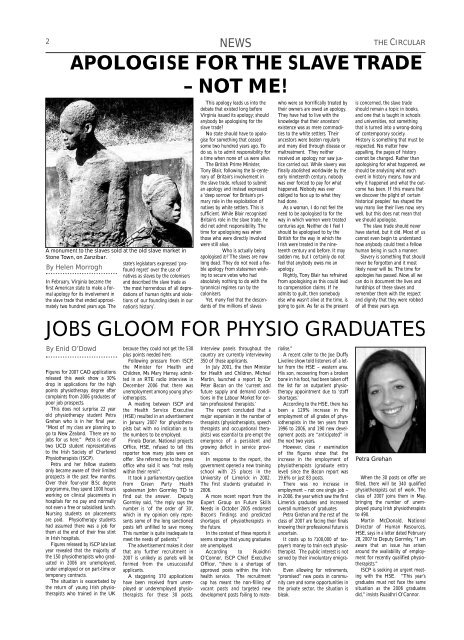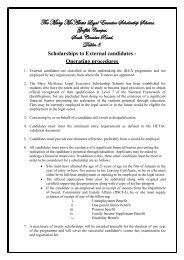to View - Griffith College Dublin
to View - Griffith College Dublin
to View - Griffith College Dublin
Create successful ePaper yourself
Turn your PDF publications into a flip-book with our unique Google optimized e-Paper software.
2<br />
NEWS<br />
APOLOGISE FOR THE SLAVE TRADE<br />
– NOT ME!<br />
A monument <strong>to</strong> the slaves sold at the old slave market in<br />
S<strong>to</strong>ne Town, on Zanzibar.<br />
By Helen Morrogh<br />
In February, Virginia became the<br />
first American state <strong>to</strong> make a formal<br />
apology for its involvement in<br />
the slave trade that ended approximately<br />
two hundred years ago. The<br />
JOBS GLOOM FOR PHYSIO GRADUATES<br />
By Enid O’Dowd<br />
Figures for 2007 CAO applications<br />
released this week show a 30%<br />
drop in applications for the high<br />
points physiotherapy degree after<br />
complaints from 2006 graduates of<br />
poor job prospects.<br />
This does not surprise 22 year<br />
old physiotherapy student Petra<br />
Grehan who is in her final year.<br />
“Most of my class are planning <strong>to</strong><br />
go <strong>to</strong> New Zealand. There are no<br />
jobs for us here.” Petra is one of<br />
two UCD student representatives<br />
<strong>to</strong> the Irish Society of Chartered<br />
Physiotherapists (ISCP).<br />
Petra and her fellow students<br />
only became aware of their limited<br />
prospects in the past few months.<br />
Over their four-year B.Sc degree<br />
programme, they spend 1000 hours<br />
working on clinical placements in<br />
hospitals for no pay and normally<br />
not even a free or subsidised lunch.<br />
Nursing students on placements<br />
are paid. Physiotherapy students<br />
had assumed there was a job for<br />
them at the end of their free stint<br />
in Irish hospitals.<br />
Figures released by ISCP late last<br />
year revealed that the majority of<br />
the 150 physiotherapists who graduated<br />
in 2006 are unemployed,<br />
under employed or on part-time or<br />
temporary contracts.<br />
The situation is exacerbated by<br />
the return of young Irish physiotherapists<br />
who trained in the UK<br />
state’s legisla<strong>to</strong>rs expressed ‘profound<br />
regret’ over the use of<br />
natives as slaves by the colonisers<br />
and described the slave trade as<br />
‘the most horrendous of all depredations<br />
of human rights and violations<br />
of our founding ideals in our<br />
nation’s his<strong>to</strong>ry’.<br />
because they could not get the 530<br />
plus points needed here.<br />
Following pressure from ISCP,<br />
the Minister for Health and<br />
Children, Ms Mary Harney, admitted<br />
in an RTE radio interview in<br />
December 2006 that there was<br />
unemployment among young physiotherapists.<br />
A meeting between ISCP and<br />
the Health Service Executive<br />
(HSE) resulted in an advertisement<br />
in January 2007 for physiotherapists<br />
but with no indication as <strong>to</strong><br />
the numbers <strong>to</strong> be employed.<br />
Finola Doran, National projects<br />
Office, HSE, refused <strong>to</strong> tell this<br />
reporter how many jobs were on<br />
offer. She referred me <strong>to</strong> the press<br />
office who said it was “not really<br />
within their remit”.<br />
It <strong>to</strong>ok a parliamentary question<br />
from Green Party Health<br />
spokesman John Gormley TD <strong>to</strong><br />
find out the answer. Deputy<br />
Gormley said, “the reply says the<br />
number is ‘of the order of 30’,<br />
which in my opinion only represents<br />
some of the long sanctioned<br />
posts left unfilled <strong>to</strong> save money.<br />
This number is quite inadequate <strong>to</strong><br />
meet the needs of patients.”<br />
The advertisement makes it clear<br />
that any further recruitment in<br />
2007 is unlikely as panels will be<br />
formed from the unsuccessful<br />
applicants.<br />
A staggering 370 applications<br />
have been received from unemployed<br />
or underemployed physiotherapists<br />
for these 30 posts.<br />
This apology leads us in<strong>to</strong> the<br />
debate that existed long before<br />
Virginia issued its apology; should<br />
anybody be apologising for the<br />
slave trade<br />
No state should have <strong>to</strong> apologise<br />
for something that ceased<br />
some two hundred years ago. To<br />
do so, is <strong>to</strong> admit responsibility for<br />
a time when none of us were alive.<br />
The British Prime Minister,<br />
Tony Blair, following the bi-centenary<br />
of Britain’s involvement in<br />
the slave trade, refused <strong>to</strong> submit<br />
an apology and instead expressed<br />
a ‘deep sorrow’ for Britain’s primary<br />
role in the exploitation of<br />
natives by white settlers. This is<br />
sufficient. While Blair recognised<br />
Britain’s role in the slave trade, he<br />
did not admit responsibility. The<br />
time for apologising was when<br />
those who were directly involved<br />
were still alive.<br />
Who is actually being<br />
apologised <strong>to</strong> The slaves are now<br />
long dead. They do not need a feeble<br />
apology from statesmen wishing<br />
<strong>to</strong> secure votes who had<br />
absolutely nothing <strong>to</strong> do with the<br />
tyrannical regimes run by the<br />
colonisers.<br />
Yet, many feel that the descendants<br />
of the millions of slaves<br />
Interview panels throughout the<br />
country are currently interviewing<br />
350 of these applicants.<br />
In July 2001, the then Minister<br />
for Health and Children, Micheal<br />
Martin, launched a report by Dr<br />
Peter Bacon on the ‘current and<br />
future supply and demand conditions<br />
in the Labour Market for certain<br />
professional therapists.’<br />
The report concluded that a<br />
major expansion in the number of<br />
therapists (physiotherapists, speech<br />
therapists and occupational therapists)<br />
was essential <strong>to</strong> pre-empt the<br />
emergence of a persistent and<br />
growing deficit in service provision.<br />
In response <strong>to</strong> the report, the<br />
government opened a new training<br />
school with 25 places in the<br />
University of Limerick in 2002.<br />
The first students graduated in<br />
2006.<br />
A more recent report from the<br />
Expert Group on Future Skills<br />
Needs in Oc<strong>to</strong>ber 2005 endorsed<br />
Bacon’s findings and predicted<br />
shortages of physiotherapists in<br />
the future.<br />
In the context of these reports it<br />
seems strange that young graduates<br />
are unemployed.<br />
According <strong>to</strong> Ruaidhri<br />
O’Connor, ISCP Chief Executive<br />
Officer, “there is a shortage of<br />
approved posts within the Irish<br />
who were so horrifically treated by<br />
their owners are owed an apology.<br />
They have had <strong>to</strong> live with the<br />
knowledge that their ances<strong>to</strong>rs’<br />
existence was as mere commodities<br />
<strong>to</strong> the white settlers. Their<br />
ances<strong>to</strong>rs were beaten regularly<br />
and many died through disease or<br />
maltreatment. They neither<br />
received an apology nor saw justice<br />
carried out. While slavery was<br />
finally abolished worldwide by the<br />
early nineteenth century, nobody<br />
was ever forced <strong>to</strong> pay for what<br />
happened. Nobody was ever<br />
obliged <strong>to</strong> face up <strong>to</strong> what they<br />
had done.<br />
As a woman, I do not feel the<br />
need <strong>to</strong> be apologised <strong>to</strong> for the<br />
way in which women were treated<br />
centuries ago. Neither do I feel I<br />
should be apologised <strong>to</strong> by the<br />
British for the way in which the<br />
Irish were treated in the nineteenth<br />
century and before. It may<br />
sadden me, but I certainly do not<br />
feel that anybody owes me an<br />
apology.<br />
Rightly, Tony Blair has refrained<br />
from apologising as this could lead<br />
<strong>to</strong> compensation claims. If he<br />
admits <strong>to</strong> guilt, then somebody<br />
else who wasn’t alive at the time, is<br />
going <strong>to</strong> gain. As far as the present<br />
health service. The recruitment<br />
cap has meant the non-filling of<br />
vacant posts and targeted new<br />
development posts failing <strong>to</strong> materialise.”<br />
A recent caller <strong>to</strong> the Joe Duffy<br />
Liveline show <strong>to</strong>ld listeners of a letter<br />
from the HSE – western area.<br />
His son, recovering from a broken<br />
bone in his foot, had been taken off<br />
the list for an outpatient physiotherapy<br />
appointment due <strong>to</strong> ‘staff<br />
shortages.’<br />
According <strong>to</strong> the HSE, there has<br />
been a 129% increase in the<br />
employment of all grades of physiotherapists<br />
in the ten years from<br />
1996 <strong>to</strong> 2006, and 190 new development<br />
posts are “anticipated” in<br />
the next two years.<br />
However, closer examination<br />
of the figures show that the<br />
increase in the employment of<br />
physiotherapists (graduate entry<br />
level) since the Bacon report was<br />
19.6% or just 83 posts.<br />
There was no increase in<br />
employment – not one single job –<br />
in 2006, the year which saw the first<br />
Limerick graduates and increased<br />
overall numbers of graduates.<br />
Petra Grehan and the rest of the<br />
class of 2007 are facing their finals<br />
knowing their professional future is<br />
uncertain.<br />
It costs up <strong>to</strong> 100,000 of taxpayer’s<br />
money <strong>to</strong> train each physiotherapist.<br />
The public interest is not<br />
served by their involuntary emigration.<br />
Even allowing for retirements,<br />
“promised” new posts in community<br />
care and some opportunities in<br />
the private sec<strong>to</strong>r, the situation is<br />
bleak.<br />
is concerned, the slave trade<br />
should remain a <strong>to</strong>pic in books,<br />
and one that is taught in schools<br />
and universities, not something<br />
that is turned in<strong>to</strong> a wrong-doing<br />
of contemporary society.<br />
His<strong>to</strong>ry is something that must be<br />
respected. No matter how<br />
appalling, the pages of his<strong>to</strong>ry<br />
cannot be changed. Rather than<br />
apologising for what happened, we<br />
should be analysing what each<br />
event in his<strong>to</strong>ry means, how and<br />
why it happened and what the outcome<br />
has been. If this means that<br />
we discover the plight of certain<br />
his<strong>to</strong>rical peoples’ has shaped the<br />
way many live their lives now, very<br />
well, but this does not mean that<br />
we should apologise.<br />
The slave trade should never<br />
have started, but it did. Most of us<br />
cannot even begin <strong>to</strong> understand<br />
how anybody could treat a fellow<br />
human being in such a manner.<br />
Slavery is something that should<br />
never be forgotten and it most<br />
likely never will be. The time for<br />
apologies has passed. Now, all we<br />
can do is document the lives and<br />
hardships of these slaves and<br />
remember them with the respect<br />
and dignity that they were robbed<br />
of all those years ago.<br />
Petra Grehan<br />
THE CIRCULAR<br />
When the 30 posts on offer are<br />
filled, there will be 340 qualified<br />
physiotherapists out of work. The<br />
class of 2007 joins them in May,<br />
bringing the number of unemployed<br />
young Irish physiotherapists<br />
<strong>to</strong> 490.<br />
Martin McDonald, National<br />
Direc<strong>to</strong>r of Human Resources,<br />
HSE, says in a letter dated February<br />
28, 2007 <strong>to</strong> Deputy Gormley, “I am<br />
aware that an issue has arisen<br />
around the availability of employment<br />
for recently qualified physiotherapists.”<br />
ISCP is seeking an urgent meeting<br />
with the HSE. “This year’s<br />
graduates must not face the same<br />
situation as the 2006 graduates<br />
did,” insists Ruaidhri O’Connor.
















